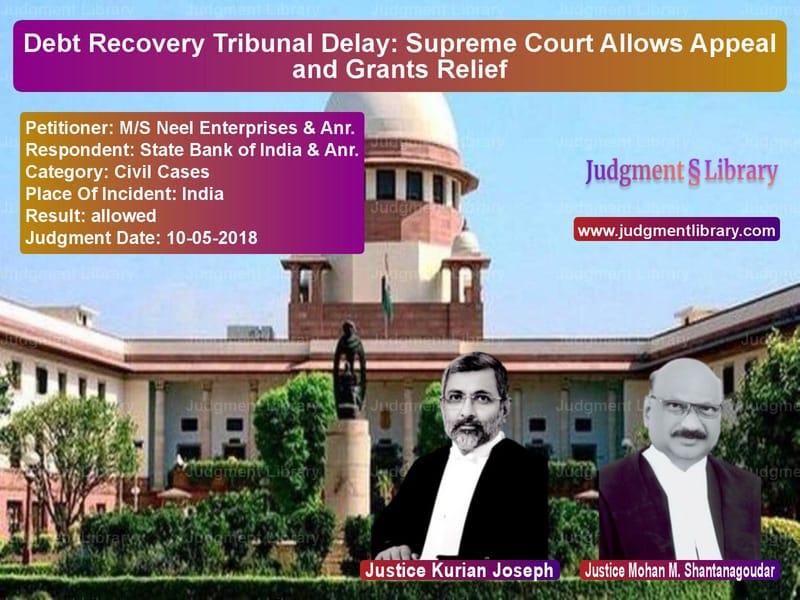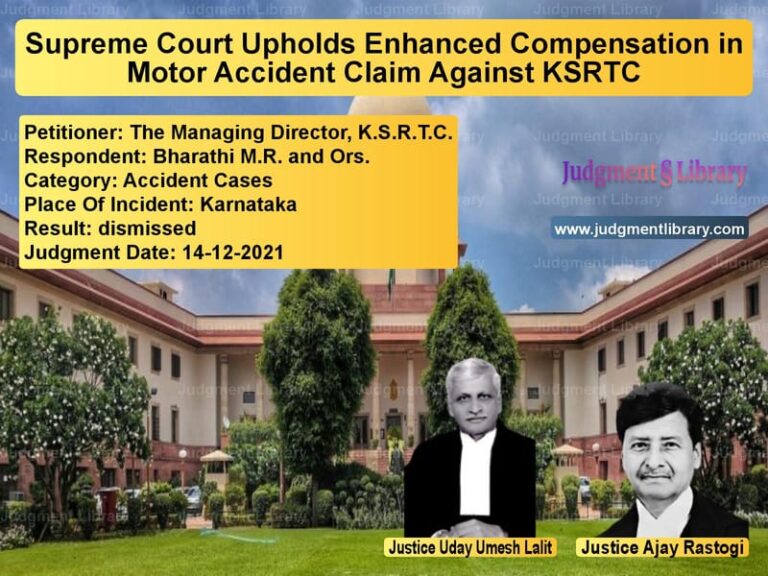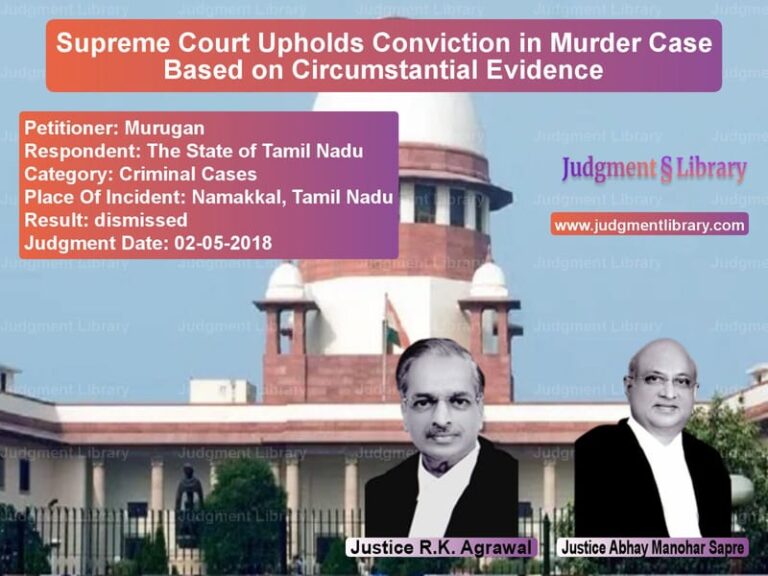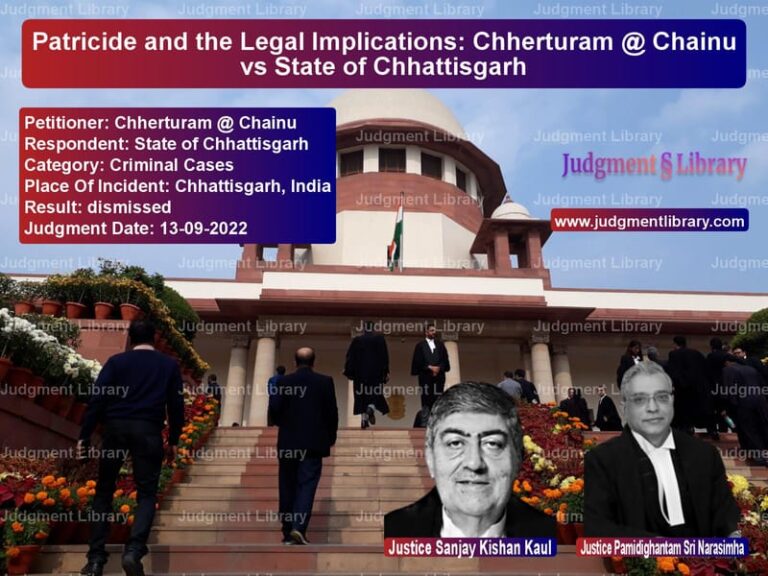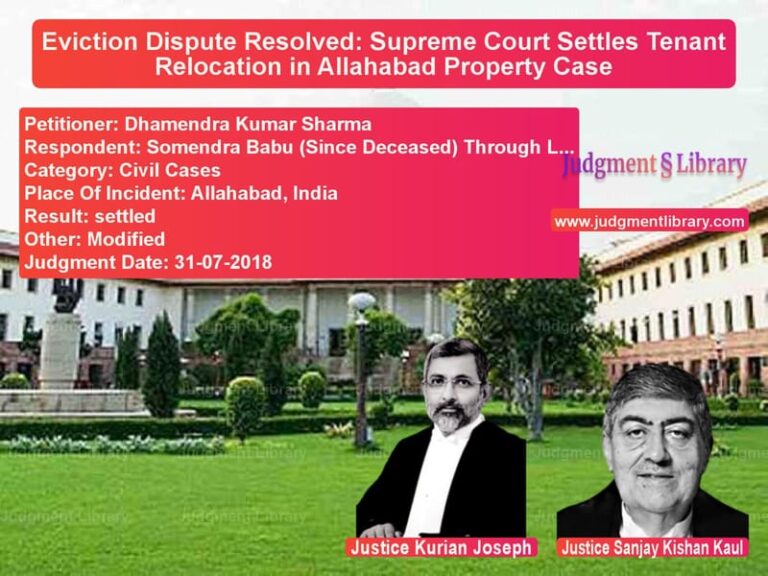Debt Recovery Tribunal Delay: Supreme Court Allows Appeal and Grants Relief
The case of M/S Neel Enterprises & Anr. vs. State Bank of India & Anr. revolves around a legal dispute concerning debt recovery proceedings under the Securitisation and Reconstruction of Financial Assets and Enforcement of Security Interest Act, 2002 (SARFAESI Act). The key issue before the Supreme Court was whether a 14-day delay in filing an appeal before the Debt Recovery Tribunal (DRT) could be condoned.
The Debt Recovery Tribunal had dismissed the appellant’s request due to the delay, and the High Court directed the appellant to approach the Debt Recovery Appellate Tribunal (DRAT) while also requiring a 25% deposit of the claimed amount. The Supreme Court intervened, setting aside the High Court’s order and allowing the appellant to pursue the case before the DRT with the delay condoned.
Background of the Case
The case began when the respondent bank issued a notice under Section 13(2) of the SARFAESI Act on August 21, 2014, to recover dues from Neel Enterprises. The appellant, challenging the notice, approached the DRT. However, due to a 14-day delay in filing the appeal, the DRT refused to entertain the case.
The appellant then moved the High Court, which relegated them to the DRAT and required them to deposit 25% of the amount covered by the notice. Aggrieved by this order, the appellant approached the Supreme Court.
Key Legal Issues Considered
The Supreme Court examined the following legal issues:
- Whether a 14-day delay in filing an appeal before the DRT could be condoned.
- Whether the High Court was justified in directing the appellant to approach the DRAT instead of deciding the matter itself.
- Whether requiring a deposit of 25% of the amount covered by the notice was reasonable in this case.
- The broader implications of delay condonation in debt recovery cases.
Arguments of the Parties
Petitioner’s (M/S Neel Enterprises) Arguments
The appellant argued:
- The delay of 14 days was unintentional and should not bar them from accessing justice.
- The High Court’s decision to direct them to the DRAT with a mandatory deposit was unduly harsh.
- They should be allowed to pursue their objections against the Section 13(2) notice before the DRT.
- The bank’s actions under the SARFAESI Act should be subject to judicial review, which they were being denied due to a minor procedural delay.
Respondent’s (State Bank of India) Arguments
The respondent bank contended:
- The law must be applied strictly, and the delay should not be condoned.
- Allowing appeals beyond the statutory timeframe would set a bad precedent and encourage delays in debt recovery.
- The requirement of a 25% deposit was a reasonable safeguard to ensure the seriousness of the appeal.
Supreme Court’s Ruling
The Supreme Court ruled in favor of the appellant, stating:
“The matter has been pending before this Court for the last two years. The Section 13(2) notice was issued in the year 2014. Having regard to the entire facts and circumstances of the case, we are of the view that the interest of justice would be met in case the appellant is permitted to pursue his objection to the notice under Section 13(2) before the DRT.”
The Court set aside the High Court’s order and condoned the delay, allowing the appellant to contest the notice before the DRT. Additionally, the Supreme Court directed the DRT to dispose of the case within two months.
Key Takeaways from the Judgment
- The Supreme Court emphasized that minor delays should not prevent access to justice.
- The Court set aside the High Court’s direction for a 25% deposit, providing relief to the appellant.
- The ruling reinforces that the DRT should focus on resolving substantive issues rather than being overly strict on procedural delays.
- The Supreme Court ordered the case to be resolved expeditiously, preventing further unnecessary delays.
Conclusion
This case highlights the balance courts must maintain between procedural compliance and ensuring access to justice. By allowing the appeal and condoning the delay, the Supreme Court reinforced the principle that technicalities should not obstruct substantive justice. The decision is particularly significant in debt recovery cases, where delays can have serious financial consequences.
The ruling serves as a precedent for similar cases where minor delays prevent parties from contesting debt recovery actions. It underscores the judiciary’s role in ensuring that procedural rules do not become an impediment to fair adjudication.
Petitioner Name: M/S Neel Enterprises & Anr..Respondent Name: State Bank of India & Anr..Judgment By: Justice Kurian Joseph, Justice Mohan M. Shantanagoudar.Place Of Incident: India.Judgment Date: 10-05-2018.
Don’t miss out on the full details! Download the complete judgment in PDF format below and gain valuable insights instantly!
Download Judgment: MS Neel Enterprises vs State Bank of India Supreme Court of India Judgment Dated 10-05-2018.pdf
Direct Downlaod Judgment: Direct downlaod this Judgment
See all petitions in Debt Recovery
See all petitions in Banking Regulations
See all petitions in Contract Disputes
See all petitions in Judgment by Kurian Joseph
See all petitions in Judgment by Mohan M. Shantanagoudar
See all petitions in allowed
See all petitions in supreme court of India judgments May 2018
See all petitions in 2018 judgments
See all posts in Civil Cases Category
See all allowed petitions in Civil Cases Category
See all Dismissed petitions in Civil Cases Category
See all partially allowed petitions in Civil Cases Category

